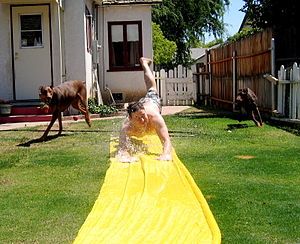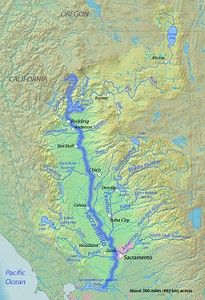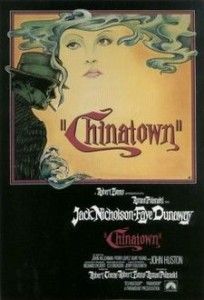Drought Politics Dries Up Wet Sacramento
by CalWatchdog Staff | March 8, 2012 3:54 pm
MAR. 7, 2012
By KATY GRIMES
Sacramento is suffering from a drought. At least that is what the city utilities department employees say they’ve been instructed to tell residents who call questioning the city’s strict water conservation policies.
 [1]
[1]
The City of Sacramento Utilities Department sent out recent email reminders that city residents can water yards and lawns only three times a week; and can wash cars once a week on a designated day, only before 10:00 a.m. or after 7:00 p.m., and only if an automatic shut-off nozzle is used on the hose. Laundry is also to be done before 10:00 a.m. and after 7:00 p.m. and home vegetable gardens are also under recommended water restrictions.
I am assuming the summertime favorite Slip-n-Slide[2] is no longer legal. And that’s too bad since Sacramento has closed most of the community swimming pools.
The city has decided [3]that, “California is facing severe water challenges, including the effects of a third dry year in a row.”
Really? I seem to recall a very wet 2011, with record rain and snowfall.
Sacramento is located on two very large and abundant rivers — the American River and the Sacramento River — as well as the Sacramento-San Joaquin River Delta, with thousands of miles of waterways.
 [4]
[4]
Drought Or Politics?
Perhaps because Sacramento needs a new sewer system, water usage could be a problem, as the website explains: “The Department of Utilities will issue a ‘Spare the Water Alert’ when temperatures are projected to reach 100 degrees for at least three consecutive days. On those days, demand for water can stretch the City’s pumping abilities. Energy costs for treating and pumping water also are at their peak.”
But more likely than failing sewer systems, is the larger scope of California’s increasingly restrictive water policy.
“Either you bring the water to L.A. or you bring L.A. to the water,” Noah Cross said in in the 1974 movie Chinatown[5], about the California Water Wars, historical disputes over land and water rights in southern California during the 1910s and 1920s.
But it’s more than water rights that have been dictating policy in California. Increasingly restrictive environmental policy has made it into legislation, signed into law, and is now the law of the land in California.
 [6]
[6]
Residents just rarely see or know about the rule and law changes until a city tightens the rope on its citizens.
Rules and laws are not made in the open, public forum as most people think. Deals are made long before public hearings are held, and with each passing law, ordinance and rule is a disempowerment of residents.
Multiple Water Agency Associations
Examples of how water policy works can be found with the complicated water associations — ACWA[7] — the Association of California Water Agencies; CUWA[8] — California Urban Water Agencies; CUWCC[9] — the California Urban Water Conservation Council. They are all non-profit organizations, and are all funded with public funds through government grants and membership fees from the water agency members.
The California Urban Water Agencies[10] and California Urban Water Conservation Council [11]both have online 2010 IRS 990 forms, the non-profit tax return form, available online.
Both associations are primarily supported by government grant money. Public water agency members pay dues as well.
According to Jessica Hess, the public information officer for Sacramento’s Utility Department, Sacramento takes its marching orders on water conservation from the California Urban Water Conservation Council and Association of California Water Agencies, and SB x7-7[12],[13] by Sen. Darrell Steinberg, D-Sacramento. SB x7-7 was passed and signed by Gov. Arnold Schwarzenegger in 2009, and requires a statewide 20 percent reduction in urban water use by 2020.
It was interesting that Steinberg, a former city councilman, state Assemblyman and current Sacramento senator authored a bill which restricts his own city on water usage originating from the rivers surrounding the city. Most politicians do everything they can to help their districts and constituencies.
Known as the 20 x 2020[14] Water Conservation Plan, “Urban water suppliers are required to establish water conservation targets for the years 2015 and 2020,” the state’s “20×2020 Agency Team” website states[15].
But as with most plans undertaken by the state, this is done not just by the public agencies, but using paid consultants as well. And often, the paid consultants have financial interests in the success of the plans, or are able to control direction of the plans.
Currently there are water consultants working on desalinization plans and projects, and agricultural desalination, which according to one state water expert who asked to remain anonymous, is the same thing as the perchlorate scam, [16]which CalWatchDog.com writer Wayne Lusvardi has written extensively on.
Some water consultants create fear about nitrate removal from water, the water expert said. Nitrates and perchlorate can have a similar effect as potential endocrine gland blockers. But according to the water expert, the easy solution is to quit drinking alcohol, eat fish twice a week, go easy on spinach, and supplement the diet with iodized salt.
The water expert said that consultants’ solutions are instead to create a “scientific” solution, to build big and small treatment plants at taxpayer expense.
The water expert said that instead of hiring employees to work for the interests of the many public water agencies associations, some consultants involved in California’s water policy have vested interests in the water issues.
———————————-
Sacramento’s Ordinance:
WATER CONSERVATION ORDINANCE[17] (effective December 9, 2009)
Residents and Businesses may water and wash vehicles on either Saturday or Sunday at their discretion during winter months (after daylight savings time ends).
During dry months (beginning when daylight savings time begins), residents and businesses are restricted to watering before 10 a.m. and after 7 p.m.
Residents or Businesses that utilize drip irrigation are exempt from watering restrictions during winter and dry month watering schedules.
Residents and Businesses may only utilize the “Water Conservation Education Workshop” to waive a fine every 24 months.
Owners of properties will be responsible for violations, whether or not they or their tenant commited a violation.
- [Image]: http://www.calwatchdog.com/wp-content/uploads/2012/03/300px-Slip_n_slide.jpg
- Slip-n-Slide: http://www.businesswire.com/news/home/20110426006875/en/Iconic-Slip-‘N-Slide®-Big-Splash-50th
- decided : http://www.cityofsacramento.org/utilities/water/documents/FormattedCustomerFAQ062009-update9811.pdf
- [Image]: http://www.calwatchdog.com/wp-content/uploads/2012/03/256px-Sacramentorivermap.jpg
- Chinatown: http://en.wikipedia.org/wiki/Chinatown_(1974_film)
- [Image]: http://www.calwatchdog.com/wp-content/uploads/2012/03/225px-Chinatownposter1.jpg
- ACWA: http://www.acwa.com/content/about-acwa
- CUWA: http://www.cuwa.org/
- CUWCC: http://www.cuwcc.org/about/default.aspx
- California Urban Water Agencies: http://www2.guidestar.org/FinDocuments/2010/680/218/2010-680218747-076a0ebc-9.pdf
- California Urban Water Conservation Council : http://www2.guidestar.org/FinDocuments/2010/680/318/2010-680318069-07c7a628-9.pdf
- SB x7-7: http://www.leginfo.ca.gov/pub/09-10/bill/sen/sb_0001-0050/sbx7_7_bill_20091110_chaptered.pdf
- ,: http://www.waterboards.ca.gov/waterrights/water_issues/programs/diversion_use/docs/msrmnt_guide121511.pdf
- 20 x 2020: http://www.swrcb.ca.gov/water_issues/hot_topics/20x2020/index.shtml
- website states: http://www.swrcb.ca.gov/water_issues/hot_topics/20x2020/index.shtml
- perchlorate scam, : http://www.calwatchdog.com/2011/10/06/undiluted-perchlorate-regs-a-scam/
- WATER CONSERVATION ORDINANCE: http://www.cityofsacramento.org/utilities/water/water-conservation.cfm
Source URL: https://calwatchdog.com/2012/03/08/drought-politics-dries-up-wet-sacramento/